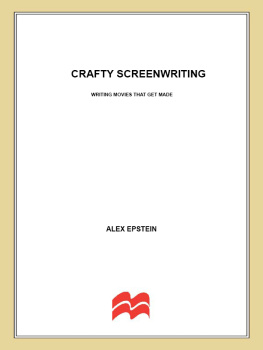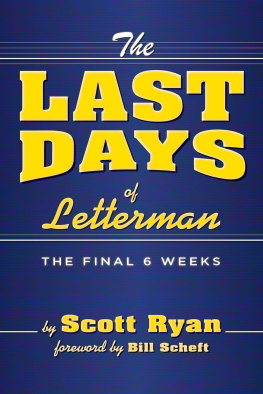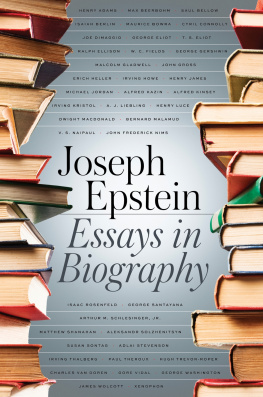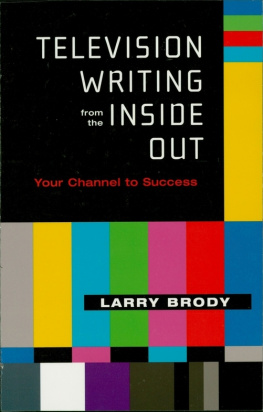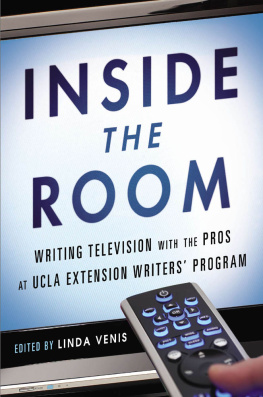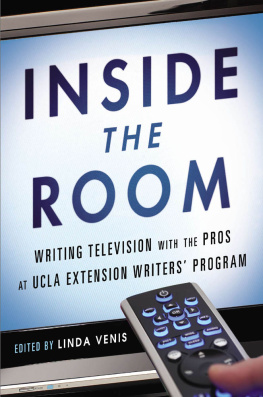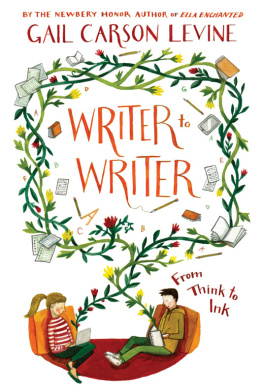Praise for Crafty Screenwriting
Finally, a book about the craft of screenwriting that sweeps away two decades of mystification and cant. From the most elevated artistic concerns to the mundane details of how many brads to bind your script with, Alex Epstein shines the light of common sense and experience on this tricky, delicate, and profitable art. Every page sparkles with wisdom, plain-speaking, and wit. It is my new answer to the dozens of questions Im asked by new writers eager to get it right: Read Alex Epstein.
Don Roos, writer-director, The Opposite of Sex and Bounce
Alex Epstein brings a screenwriting professionals honesty, skill, and expertise to a field otherwise crowded with how-to-write quacks.
John Badham, director, Saturday Night Fever, War Games, and Stakeout
This is that rare kind of book about screenwriting which is truly helpful. I recommend it to anyone seriously wanting to write screenplays that get produced. Its full of detailed and no-nonsense guidelines about what writers should do to make their scripts better, and about what they must do if they want their scripts to be considered for production. Its a how-to book on how to write not merely a script that shows you offbut a script that convinces producers to make it into a movie. Its a book that genuinely wants to helpand does.
Eleanor Bergstein, screenwriter, Dirty Dancing
I wish more writers knew what makes a script worth producingnot just how to structure a plot and write good dialogue, but how to come up with a story that people want to see on the screen. Crafty Screenwriting explains all of that in a clear and often hilarious way. I hope a lot of writers read this book; then Ill get more screenplays I want to make into movies.
Paul Colichman, producer, Gods and Monsters, Tom & Viv, and One False Move
Crafty Screenwriting is an INVALUABLE TOOL for anyone attempting to penetrate the dangerous thickets of Hollywood, with an idea in their hand and not much else. It is totally impressive how this book somehow gives you under one cover an actual, workable ROAD MAP that if followed with a strict loyalty to your OWN creativity, will guide you through the often terrifying journey of confusion and rejection toward the bright realization of your singular talent!
Henry Jaglom, writer-director, Dja Vu, Always, and Eating
Crafty Screenwriting explains what no one else seems to be explaining: how to write a screenplay thats not only a good read, but a good movie project that a producer can make into a good movie. Shrewdly realistic and funny.
Pieter Kroonenburg, producer, The Hotel New Hampshire and To Walk With Lions
This refreshingly undogmatic book crystallizes the knowledge that really skilled screenwriters all have, and lays it out plainly for anyone to absorb. I dont think there are many writers (or producers and executives, for that matter) who wont learn a great deal from this book.
Roger Spottiswoode, director, Tomorrow Never Dies, The Sixth Day, and And the Band Played On
Finally a book on screenwriting that gets it all right. Over and over again, Epstein names the key points to writing a script that sells. Im going to pass this thing out like Lifesavers.
Ed Elbert, producer, Anna and the King and The Mighty Quinn

For Robin Spry
who believed
Contents



Acknowledgments
This book owes a deep debt to:
The many working writers who have taught me what they know
The readers of my blog and website, who let me know what they wanted to know
The producers and network executives who have generously paid me to learn how to write TV
And my family, who make all my achievements into celebrations.
Introduction
Why You Want to Write TV
When I was first coming up in the biz, movie writers looked down at TV writers. If this doesnt work out, theyd say, theres always TV. TV writers had an inferiority complex: Id love to work in movies. But I cant afford it. (Even then, TV writers made more money.) A movie could be made for a niche audience, but not TV. The three networks only aired shows that the entire country could watch. It was the 80s, and Miami Vice was the most innovative thing on television.
Then cable blossomed. Now everyone from HBO to the Playboy Channel to PAX to FX to Showtime is producing their own flavor of programming. Groundbreaking pay cable shows like The Sopranos and Six Feet Under have forced the networksnow five of themto push the envelope on language, nudity, moral darkness, and narrative invention. Today, the sheer appetite that all these channels have for programming means that an offbeat story has more of a chance of finding a home on TV than it does in a movie theater.
Thats all good. But its not why you want to write TV.
A movie is a one-night stand. Every movie invents its own world, its own characters, its own tone, its own dialogue style, its own way of coming at a story. Even sequels change the rulesjust look at the difference between Alien and Aliens . You spend a night with a movie, and you move on. Thats exciting, but its limiting. How deep can your audiences relationship with a movie be? How much can you, as a writer, show the audience about characters theyll never spend more than two hours with? For the writer, a movie has the frustrations of a one-night stand: all that emotion, and in the morning its over.
A TV series is a relationship. Its world lasts, whether its lost dinosaurs, cops n DAs, or yuppies competing for a job working for Donald Trump. Each episode shares that world and fleshes it out. We get to know the same core characters better, coming to love or hate them. A series tells stories with a consistent tone, reusing the same narrative structure, allowing it to concentrate on the richness of those stories.
As a writer, youre the person wholl spend the most time with your characters and their stories. If youre a movie writer, youll be the one creating the world and then losing itespecially if, as usual, youre not the one asked to write the sequel, or even the shooting draft. If youre a TV writer, you can get to play in the world you and your fellow writers have created for as long as your show runs.
Thats fun. It also means that TV is about twice as hard to write as movies. How do you find a format that can sustain 100 episodes? How do you create characters who will be consistently compelling over that many stories? How do you find a tone you want to sustain from fall through to spring? How do you lure the same viewers back week after week?
The answer is in the template . Every TV show, whether drama or comedy, fiction or reality, has hidden rules that define what it doesthe format of the storytelling, the goods that every episode must deliver. Delivering those goods according to the templates hidden rules, while still keeping your stories surprising and compelling, makes TV writing hard. Delivering those goods regularly and on time, facing notes from everybody from the assistant director to the head of the network to the actor calling from the set, makes TV writing harder. If writing a movie is a one-night stand, writing TV is like a marriage. There are a lot more rules, and you have to work at it harder. But you get an experience thats richer and deeper, that can fulfill you for years or even decades.


